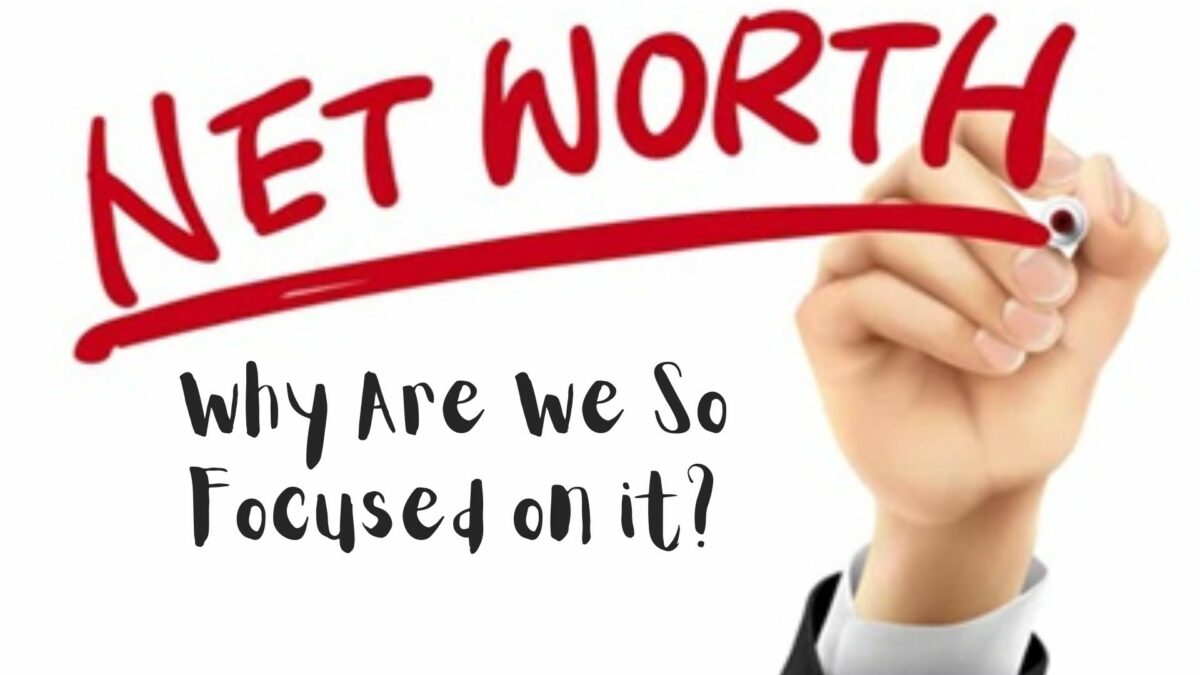Your net worth to the world is usually determined by what remains after your bad habits are subtracted from your good ones.”
–Benjamin Franklin

One of the first things that they teach you in any personal finance course is how to calculate your net worth.
For those of you who do not know how to do so, it’s a simple calculation:
Assets – liabilities = net worth
Easy peasy. You can calculate it by hand, on a spreadsheet, or on a tracking program like mint.com.
Now you know your net worth.
So what?
What does it truly mean?
Theoretically, you could sell everything you own, pay off all of your debts (hopefully you don’t have any to begin with), and have a pile of cash sitting there.
But, if we continue along this little academic exercise, you wouldn’t have anything. You might have the clothes on your back if you didn’t go hog wild (in which case, subtract $20 from your net worth, unless you’re like me and wear t-shirts that you got for free in college).
What would you do then?
You’d probably have to go out and either rent or buy stuff so that you could live. You’d need clothes. You’d need a place to stay. You might need some transportation to get to work. You’d want something to sit on besides the floor or cardboard boxes, and the same goes for sleeping.
Plus, unless you’re a thrift store shopper with skills mad enough to make Macklemore jealous, you’d probably have less cash than you originally would have had because you’d lose money selling your stuff and then buying replacement stuff.
But, we still haven’t answered the original question: so what?
I scratched the surface of this discussion in my video “Do You Count Home Equity in Your Net Worth?”
One of the issues that I have with net worth is that using net worth as a metric means that you risk conflating investments that don’t come with corresponding expenses and investments that do come with corresponding expenses.
What does that mean?
There are two big financial questions that most people have:
- How much money do I need to live on each month?
- How much do I need to retire?
The answer to the second question is found by knowing the first question. How much money you need to retire is a function of how much it costs you to live each month, along with a few other variables.
However, let’s say that you include your house in that number to answer the second question. If you need to sell the house, then, upon selling the house, you’ve created a housing expense, as you have to live somewhere, unless you can find a place to live in for free. You’ve affected the answer to the first question – how much do I need to live on each month – which affects the answer to the second question – how much do I need to retire – and yet, you were using the previously lower expense number to determine if you had enough to retire.
As I discussed in the article “Why You Shouldn’t Obsess Over Net Worth”, having a “number” won’t make you happier.
Instead, we should be asking a different question.
What net income can my assets generate?

Notice that I used the term “net income” instead of simply asking “what income can my assets generate?”
I intentionally chose the term net income, because net income means income minus expenses. Let’s say that you rent your house out. You’ve increased the income side of the equation. However, in doing so, you’ve kicked yourself out of the house (unless you’re renting out a room or a part of the house), and now you need to find a place to stay. You’re also increasing the expenses side of the equation. Net income has remained roughly the same.
So, when you’re looking at your target number for how much you need to be able to retire when you want to and can cover your estimated expenses in retirement, I argue that you should only include liquid assets – mutual funds, money market accounts, etc. – in that calculation. If you have extra things that you don’t need, like an extra car or stuff around the house that you’d sell, then you can include them, but don’t overvalue them. They’re not likely to really affect the “can I retire” question one way or the other.
What about the house?

The house is a tricky one. I advise people not to include the value of their homes in determining the target number because they’ll always need a place to live. Even if they plan on moving to a retirement community, the general assumption is that they’ll use the proceeds from selling the house to fund the move to the retirement community.
There are some exceptions to that rule, though:
- You are comfortable using a reverse mortgage. I outline my position on reverse mortgages in “Reversing My Stand Against Reverse Mortgages.” A reverse mortgage does generate income without creating an equivalent expense, but they’re only applicable under specific conditions.
- You’re planning on downsizing. Most older people don’t need a large home and keep it for the wrong reasons. If you plan on downsizing, you could sell a more expensive house, buy a less expensive house, and keep the difference.
- You can rent out parts of your house. If you have an in-law apartment or a finished basement that you would be willing to rent out for income, then you can include that capacity in your calculations.
When we look at what we have and how much we need to retire, we should ask ourselves:
How much do I need to generate the income I need to live on by selling it?
That amount is not the same as net worth.
Are we too tied to net worth as a metric? Did I miss benefits of knowing your net worth? Let’s talk about it in the comments below!
Author Profile
- John Davis is a nationally recognized expert on credit reporting, credit scoring, and identity theft. He has written four books about his expertise in the field and has been featured extensively in numerous media outlets such as The Wall Street Journal, The Washington Post, CNN, CBS News, CNBC, Fox Business, and many more. With over 20 years of experience helping consumers understand their credit and identity protection rights, John is passionate about empowering people to take control of their finances. He works with financial institutions to develop consumer-friendly policies that promote financial literacy and responsible borrowing habits.
Latest entries
 Low Income GrantsSeptember 25, 2023How to Get a Free Government Phone: A Step-by-Step Guide
Low Income GrantsSeptember 25, 2023How to Get a Free Government Phone: A Step-by-Step Guide Low Income GrantsSeptember 25, 2023Dental Charities That Help With Dental Costs
Low Income GrantsSeptember 25, 2023Dental Charities That Help With Dental Costs Low Income GrantsSeptember 25, 2023Low-Cost Hearing Aids for Seniors: A Comprehensive Guide
Low Income GrantsSeptember 25, 2023Low-Cost Hearing Aids for Seniors: A Comprehensive Guide Low Income GrantsSeptember 25, 2023Second Chance Apartments that Accept Evictions: A Comprehensive Guide
Low Income GrantsSeptember 25, 2023Second Chance Apartments that Accept Evictions: A Comprehensive Guide

